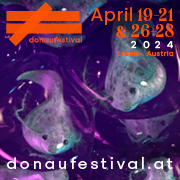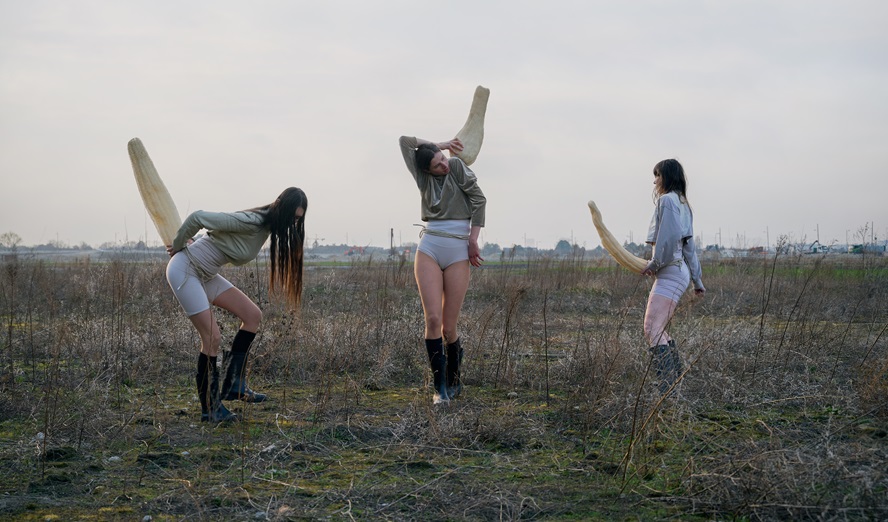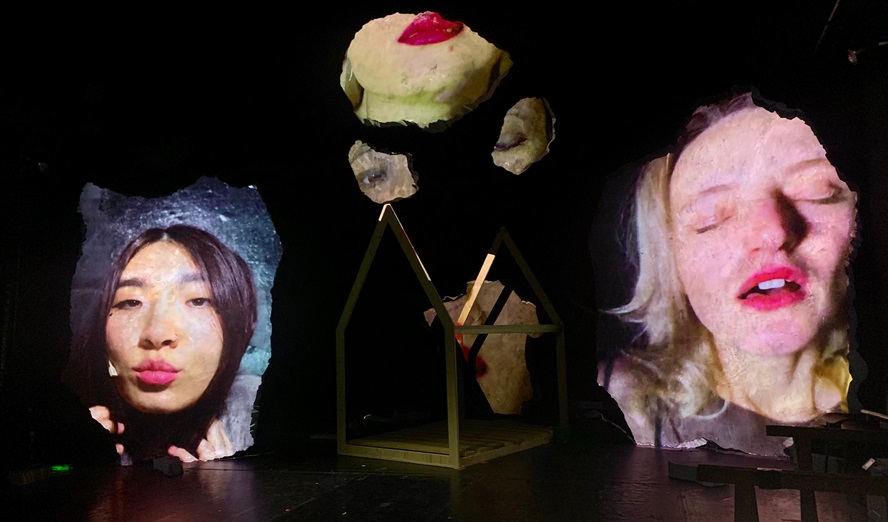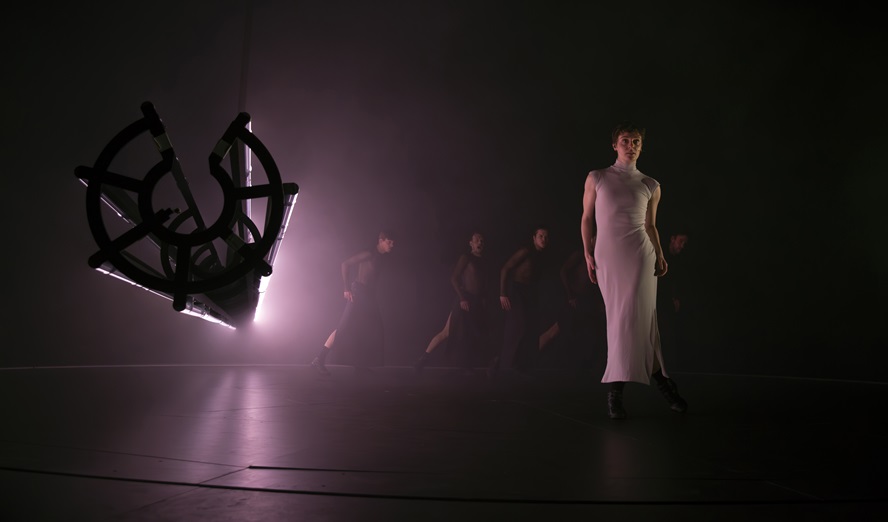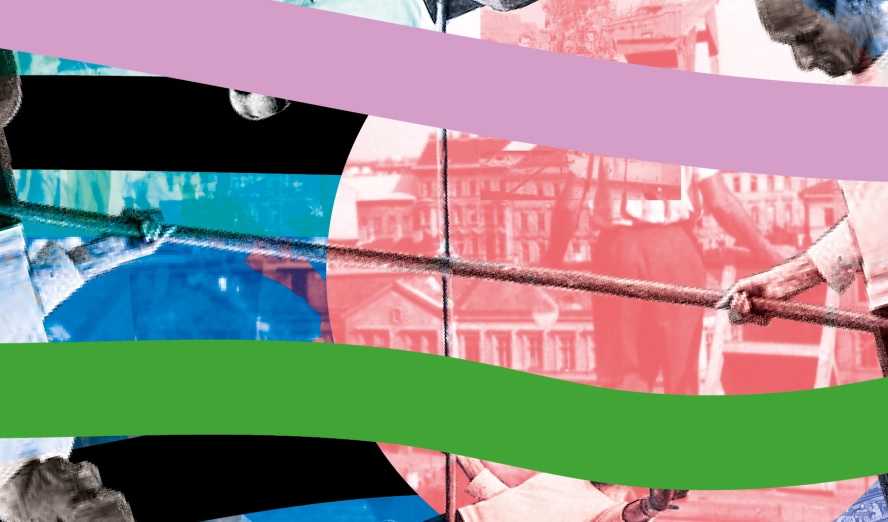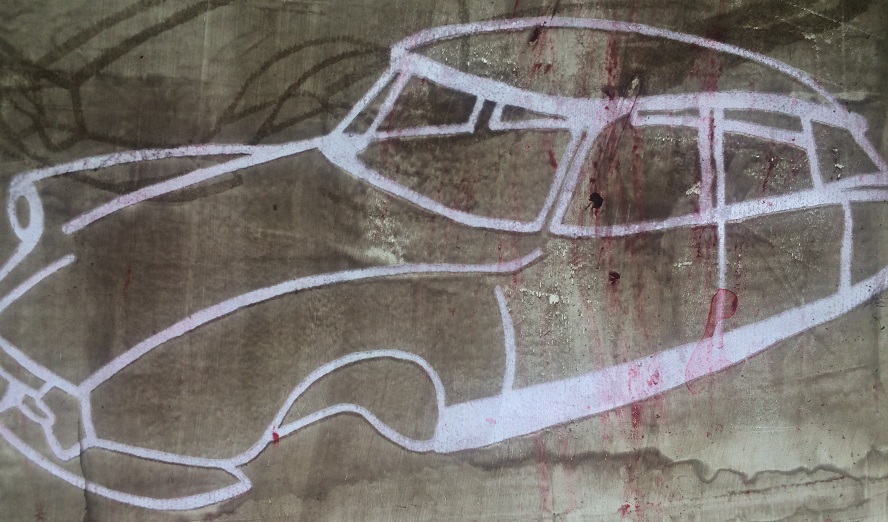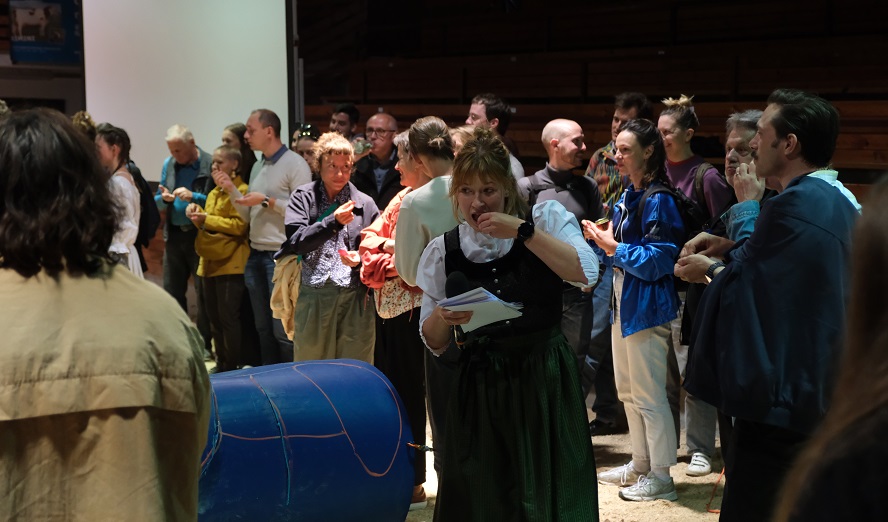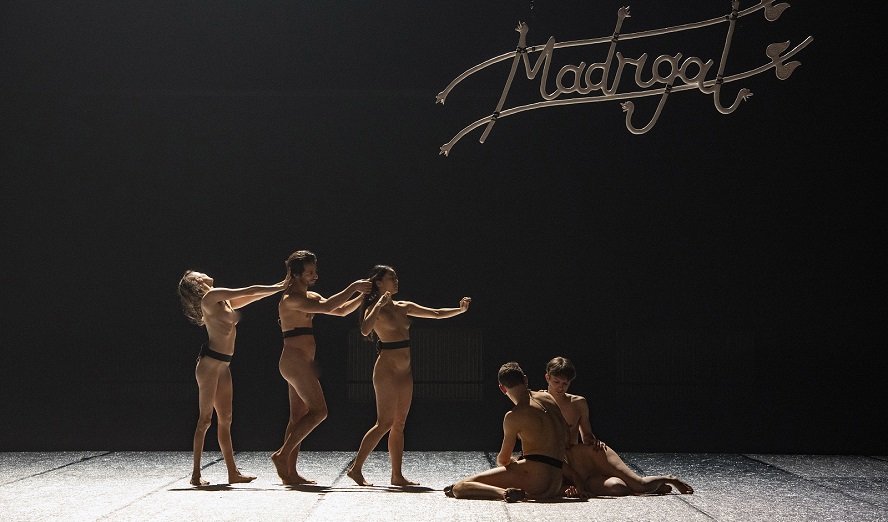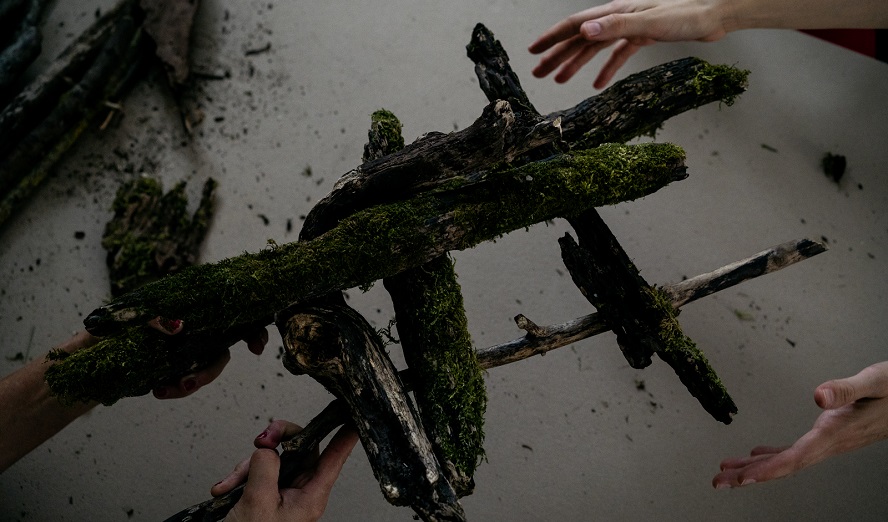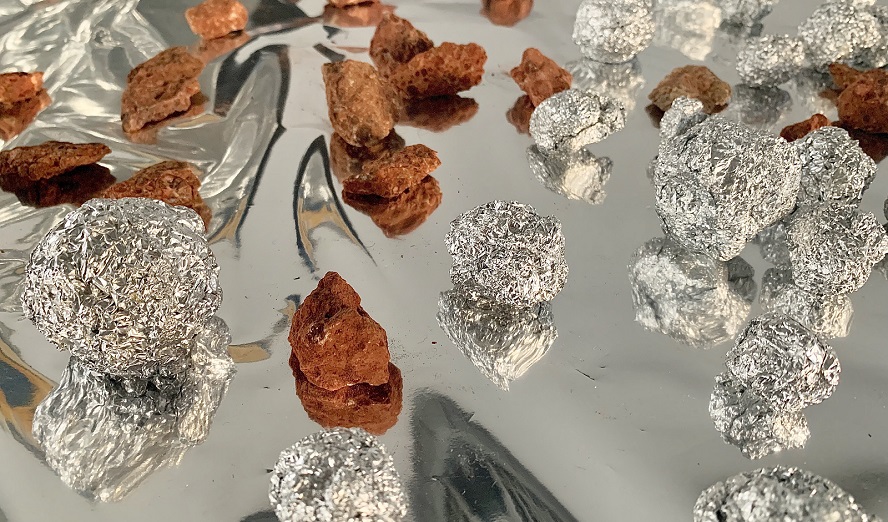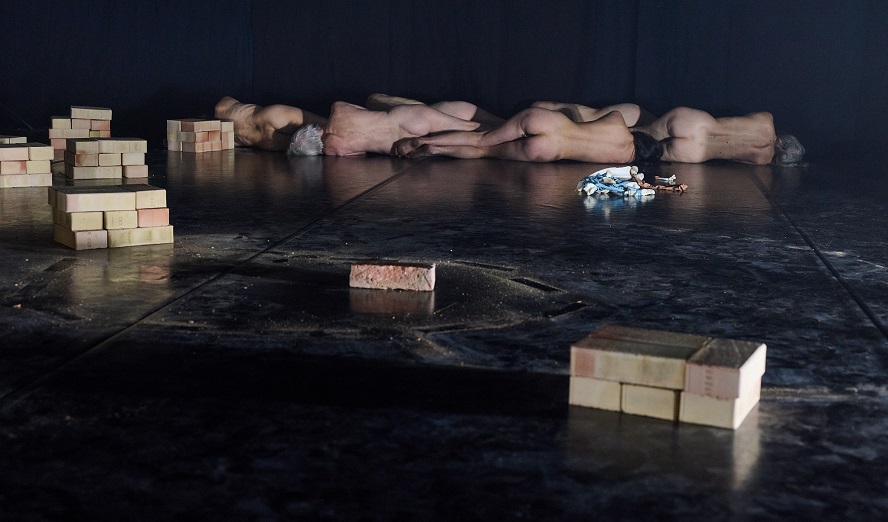Cowbirds are a Vienna-based female collective, dealing with forms and structures of traditional singing from Corsica, Sardinia, and Sicily since 2013. Coming from the contemporary dance and performing scene, they explore the potential of polyphonic singing and create different formats of presentation: live sound installations, concerts, and participatory performances. They emphasize bringing together traditional music with new music and contemporary performance. So far, cowbirds have worked with Austria-based and Germany-based choreographers, composers and visual artists such as Paul Wenninger, Peter Jakober, Raúl Maia, Ben J. Riepe, Elisabeth B. Tambwe, and Thomas Jelinek, amongst others. The collective also pursues regular exchanges with singers and musicians from Corsica and Sicily. In 2018, they released their first album »polyphonic tracks«, an album made in the spirit of field recording.
»In Corsica and Sicily, traditional singing lies in the core of the social fabric. Singers are neither amateur nor professional, they only obey if necessary. Unlike a choir, polyphonic singing follows the rules of its own initiatives and responsibilities. There is no conductor, no hierarchy. The construction is organic and collective. Each voice has a specific role. One voice is nothing without the others, the others are nothing without that one voice. There is a constant negotiation between the individual and the collective. This is at the base of our condition as human beings; as we are by definition, for better or worse, bound to each other.« This is how initiator Clélia Colonna describes the Cowbirds concept. skug asked her some more questions.

skug: Why did you choose the name cowbirds for this all-female project? Is there a special characteristic about the Cowbird that is also a unique feature of the quartet?
Clélia Colonna: We started searching for a name about a year after we started to practice together. We searched in different directions and we thought of associating two elements, linked to singing and to scape. Cowbirds are small birds living with cows and are known for laying their eggs in other birds’ nests. An idea that suits us, since we like the idea of infiltrating our urban scapes with different modes, harmonies, and habits rooted in between tradition and fiction. Birds are singers, there is the obvious reference to cowgirls and the association of two almost opposite animals in their features and symbolism: the cow as a spirit of the earth and the bird symbolizing – according to different cultures – spirit or love. I guess that we have developed is a genuine sound, mostly because we’ve been practicing for five years and have shared so much experiences and projects together. This nourishes our history. We have built a common ground based on our common experiences in Vienna. Each one of us is hosted here, since none of us is a native from Vienna.
How important is the term tradition, since you don’t change the lyrics when you practice and perform the songs? What about the term belonging, to whom do the songs belong?
This is an interesting issue and difficult to answer. I guess that we stage traditional singing as a genre or a way of singing. It’s not pop, it’s not jazz, it’s not minimal music, it does not come from the mind of a composer, it’s not performed in a black box with amplified instruments, nor does it come from a computer. It is traditional because it is carried from ear to mouth, from mouth to mouth in a hazardous manner, it changes always but still keeps a certain form. Tradition is to carry and to give – tradere and dare in Latin. I guess that this is what we do, we explore, we transform, obviously, because we make it ours and we pay it forward. Ownership is also very tricky, it’s like land; who does it belong to? Is it public or private property? I think it belongs to the soil and the lives it emerged from, this is clear, but if you work and care for something, then it also belongs to you, maybe we should not think in terms of belonging or property but of borrowing. I think if you respect the form and the people and don’t profit on other’s people work, it’s fine.
How important is the political context (if there is one) of the songs?
It depends on the songs but I think that it is one very important element because politics shapes us, our ways of thinking, of relating to the world. Some songs are obviously political, other’s not, but if one reads between the lines, it is always related to a human condition, social condition, economic situation etc.
What do you mean when you say that philia is important for this project cowbirds?
I came across this notion reading Bernard Stiegler. Of course, the concept is from Plato, but suddenly, via Stiegler, I understood that this is also something we are doing in our practice, triggering social links, in between friendship and brotherhood. Not only among the four of us but also among our listeners or the people who come to our workshop. In this type of singing, you cannot escape looking at the person singing with you, you cannot escape being present to the situation and in my experience, I can only sing with people I love – even if we only meet for a song. This is something that we need to share, that we need to give and receive if we want to sound together. In polyphony, the pitch is given by the soundscape and surroundings. There is no instrument to support us, we do it ourselves and we need to tune and harmonize together, and I think that it is an interesting aspect also on a political level. Take three persons randomly. If they produce a tune together, they can produce the most beautiful sounds. On one condition, you have to open up. Because even if you work a lot you cannot sing with someone if you don’t adapt to their rhythm, way of doing, of hitting the tone, carrying the melody. Stiegler also developed the concept of Pharmakon, which means poison and remedy in ancient greek. I also find this interesting: tradition – as we know it – is both a poison and a remedy. And throughout time it became a concept for symposiums that we organized. Where we wanted to make a bridge between tradition and fiction within our scene of contemporary performers. For example, we invited traditional and contemporary musicians to improvise together. It has been magic. In this quest, Anita Kaya from Im_flieger has supported us a lot.
How often do you practice? Do you have special rituals or routines?
This past year, we practiced less regularly and more intensively but, before that, we were meeting rather regularly a couple of times a week. We had no choice because it’s a world that we had to enter, a musical language that was unknown to us: modal and not tonal, different ways of singing, different resonating spaces. It took us a long time to understand how it worked for each one of us separately and together. Each voice (bassa, secunda, terza) has a specific texture, specific function, we cannot work as individuals apart from learning text and melody because everything happens in between, everything happens in negotiation with the others, the surrounding scape. It’s like driving. You can learn to drive alone but once in the traffic, it’s about real-time negotiation. We met and continued to meet everywhere, depending on our possibilities: churches, chapels, dance studio, streets etc. But I guess that we like kitchens the most. We don’t really warm-up, we chat, make coffee and start to sing, and get more and more into detail. We also travel together, we went twice to Corsica, once to Sicily, to Ausseerland and to Upper Austria to practice and to listen.
Why do you often move, change places during a concert? Is this also a symbolic way to show that our surroundings (in real-time) and the soundscapes are constantly shifting?
We believe that the type of singing we are doing is not meant for representation, but that it is an experience on many levels: physical, harmonic etc. When we perform we aim to offer different experiences to the listener, so that his/her listening can be stimulated in various ways. We don’t only hear by ear; our whole skin is a surface of perception and we try to touch upon this aspect. Sound also comes through vibrations etc. In Indian Music theory, each note is associated with a part of the body, meaning that it makes it physically vibrate. In Mediterranean traditional singing, people often sing in a circle, aiming to make the 4th or 5th voice appear (depending on the number of voices, three in Corsica, four in Sardinia). So the song exists within this circle, not outside, and at times we aim to put the audience inside of the circle so that they can really hear, experience the harmonic games, and frictions presented inside the circle. You are right, soundscapes and surrounding are always shifting and one of our aims is also – at times – to open the ear to the outside. We build the dramaturgy of our concerts or performances from this point of view: What do we want people to hear? It can be a song in relation to the surrounding scape, it can be the harmonic game of a specific song etc. I didn’t mention the procession which is also an important aspect of the Mediterranean practice: duration, walking, changes of acoustics.
How do you feel while singing? What makes you so passionate about it? (How) did it change you, affect your body, your physical shape?
I am passionate about it because it is always in process, you never get fixed results, it is a world of oral hirstories, it lies in the air, it’s not written, not fixed somewhere like a novel. It’s a story, an old tale asking to be told again with infinite variations and I want to crack the voice and interpretation of each singer I hear, I want to crack each mode and ornamentation I hear, to be inside, understand what it tells. I am in love with Corsica, its poetry and the millions of stories and sorrows being carried through this. Also, when singing together, especially the religious repertoire – which structure is very specific, very solid in a way – you feel like nothing can happen to you. The feelings fluctuate all the time: angry, stressed, moved, happy, wanting to cry… Physically it’s quite demanding. You need to be tonic. I feel that we are always fighting against gravity which makes us go lower and lower in pitch. Seeing the same pitch in time is difficult, a challenge. That is why I love to practice »Ison«, the drone in Byzantine music. It is a very good exercise, it is an »anchor«. But as I said, you need to be tonic (this traditional music comes from agricultural societies; the bodies of the singers are very strong, very muscular) and very present in each moment.
How is it for you as a female group to sing and perform songs that were originally only sung by men in a male-dominated society?
This is not really an issue because this stems from habits. The fact that predominantly men sing in Mediterranean cultures is the consequence of the structure of a society but it’s not a rule. This repertoire does not belong to a gender. Traditionally women sang lullabies, complaints around the bed of the dead person or mourned love. But again, it’s the result of a social organization, it’s not a rule.

»Negotiations Special« takes place at the Tanzquartier subsidiary »Tanzfiliale« at Neustiftgasse 31 with performances of dancers and a durational concert by cowbirds on the 27th and 28th of October 2018, from 10 am to 6 pm.
Link:
https://tqw.at/en/event/negotiations-spezial/
Mica-Interview auf Deutsch:
https://www.musicaustria.at/unser-aktions-und-kommunikationsraum-befindet-sich-zwischen-tradition-und-fiktion-clelia-colonna-und-irene-coticchio-von-den-cowbirds-im-mica-interview/

